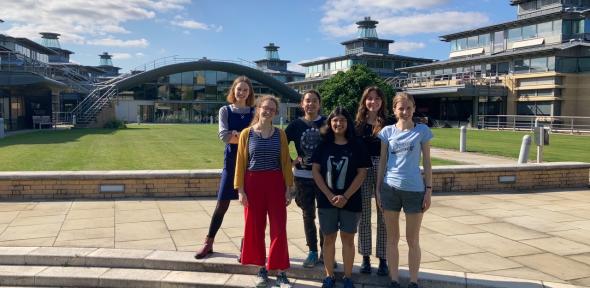
This summer the very first participants in the Philippa Fawcett Internship Programme experienced life as a researcher in the Faculty. This new internship programme aims to encourage more women and non-binary students to progress to research careers, and is open to undergraduate and Masters students from UK or around the world.
The idea for the new internship programme came from Tamara Grossmann, a final year PhD student in the CCIMI. "I was slightly frustrated with how few women PhD students there were, and even fewer women higher up the ranks. As the CCIMI was already funding internships, [I thought] why can't we fund internships specifically for women?"
Grossman credits her personal experience of doing an internship with her current supervisor, Professor Carola Bibiane Schönlieb, Director of the CCIMI, as the reason she is now doing a PhD at Cambridge. As a masters student in Germany, she didn't have any plans to do a PhD, but had the opportunity for a research internship with Schönlieb's research group. "[It gave me the] experience of working alongside other researchers, and noticing that you yourself can do research. I wouldn't have done a PhD without that internship."
The internships are funded by the Cantab Capital Institute for the Mathematics of Information (CCIMI) as part of the long-running Cambridge Mathematics Placements programme (CMP). "Typically the CMP is open to Cambridge students, we wanted to open up [the Philippa Fawcett internships] more broadly to international students as well," says Josh Stevens, the CCIMI coordinator. "Where you are in your undergraduate degree, and where you are studying doesn't matter."
They wanted to name the internship programme after a woman mathematician with a significant connection to Cambridge. Philippa Fawcett studied mathematics at Cambridge at the end of the 19th century, although she was not allowed to be awarded a degree because she was a woman. Women had been allowed to sit the undergraduate exams (called the Mathematical Tripos) since 1880, and in 1890 Fawcett was the first woman to get the top score in these exams. As well as teaching mathematics, she went on to do significant work in education in the UK and South Africa.
During these weeks I've received amazing support from my supervisor, my mentor and the programme. Eleonora Svanberg
This summer the first Philippa Fawcett interns joined research groups in Cambridge. As well as a project supervisor, they also were assigned a mentor, one of the women PhD students. "The great thing about Philippa Fawcett internships is that the interns can share experiences, connect with mentors, and get involved with CCIMI and CMIH [the Cambridge Mathematics of Information in Healthcare Hub] coffee mornings and seminars. They can ask questions that they wouldn't ask a supervisor," says Grossmann.
Thirst for research
"We originally had funding for three [Philippa Fawcett] internships, but due to the calibre of the applications we received we found funding for six," says Stevens. Half of the interns were Cambridge students, one intern was studying at Durham University and two students travelled from Sweden. They each conducted their own research project over the summer, some self-proposed and some drawing from a list of suggestions provided by Faculty researchers. The projects ranged from work on the mechanics of planetary formation to statistically combining scientific studies of biodiversity.
The programme has provided new confidence as well as research experience to all the participants. Maartje Wisse, a student from Cambridge who worked on a project in knot theory for her internship, explained: "The main thing the programme provided for me was confidence and a belief that I am indeed capable of doing research." And for Eleonora Svanberg, from Stockholm University, the experience has convinced her to pursue a career in mathematical research: "Coming from an external university, experiencing Cambridge was incredible. The department was very welcoming and I've been very inspired by the mathematics research that is done here."
Next summer the Faculty will be supporting not only Philippa Fawcett internships but also introducing new internship opportunities for other under-represented groups. "We are trying to support students who have a thirst for research," says Stevens. "We consider it a fantastic success for the first time around."
Featured in the photo above are (front row, left to right) Philippa Fawcett interns Roan Talbut and Sara Rousta, along with fellow CMP intern Zsuzsanna Baran, and (back row left to right) Philippa Fawcett interns Maartje Wisse, Thalia Seale and Eleonora Svanberg.
